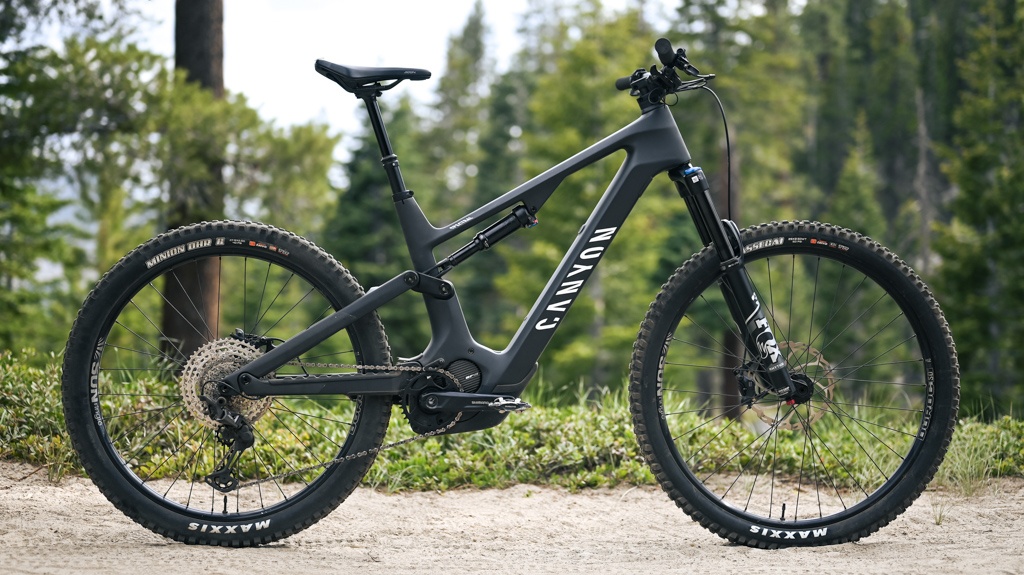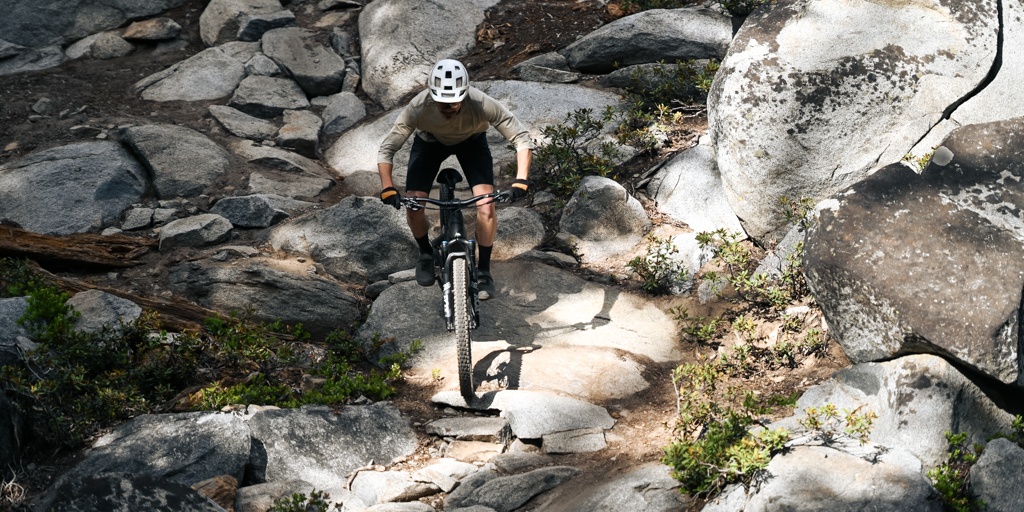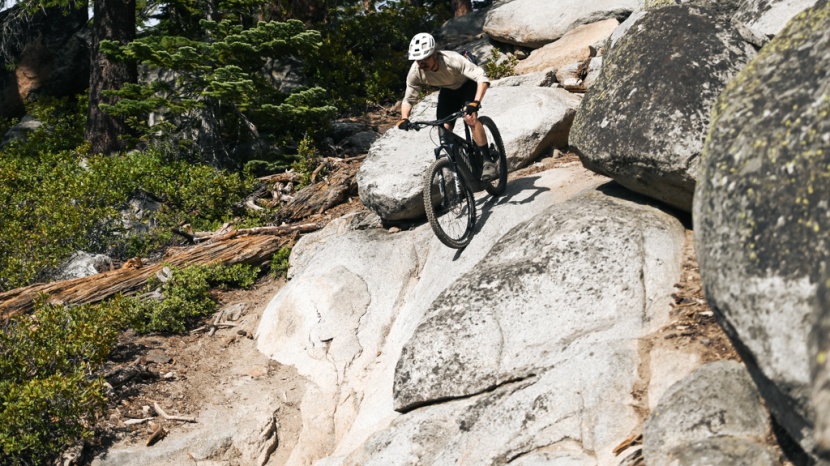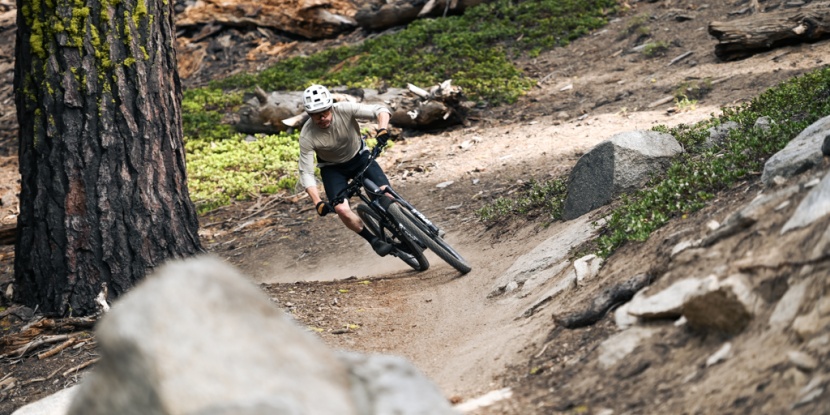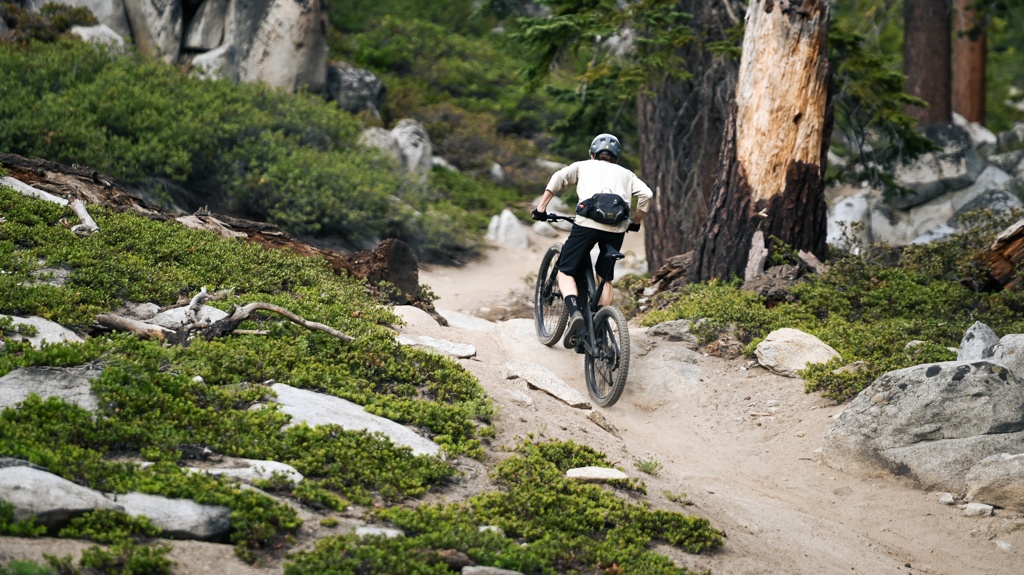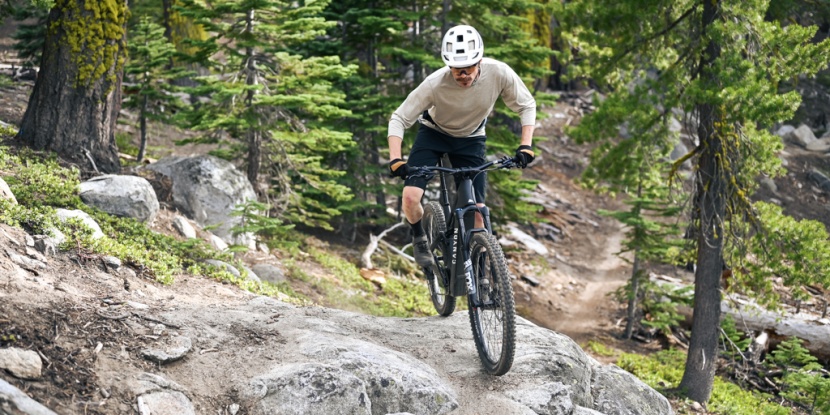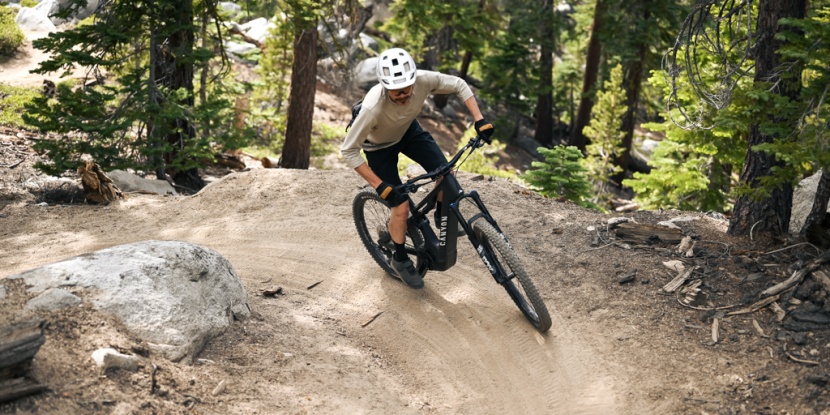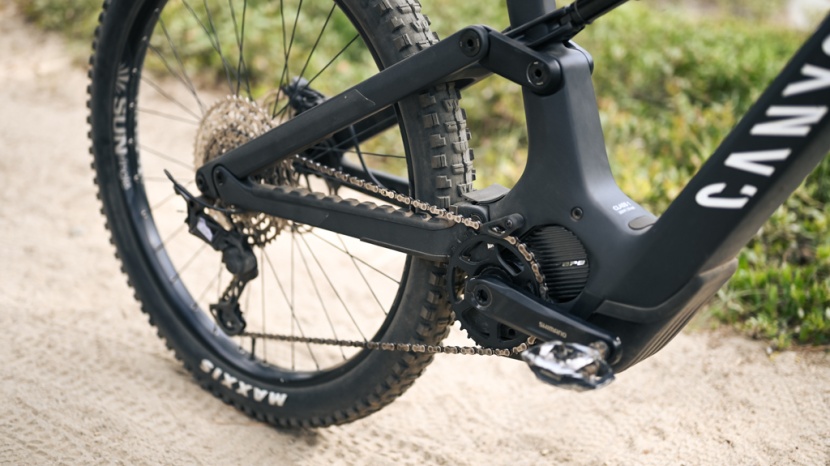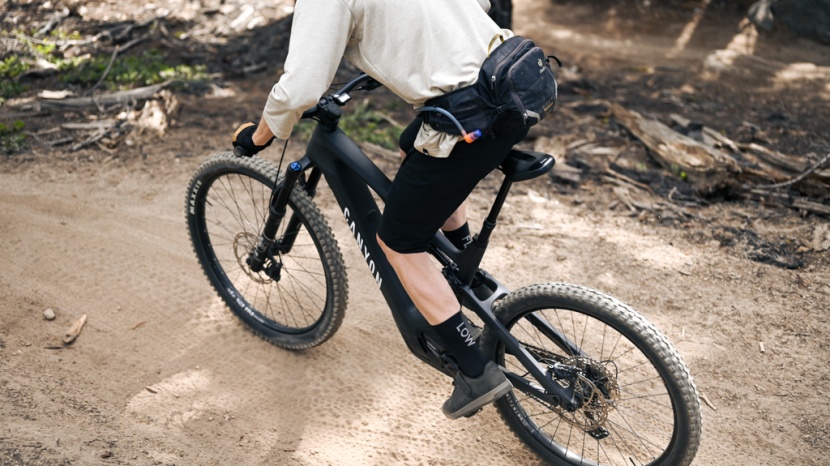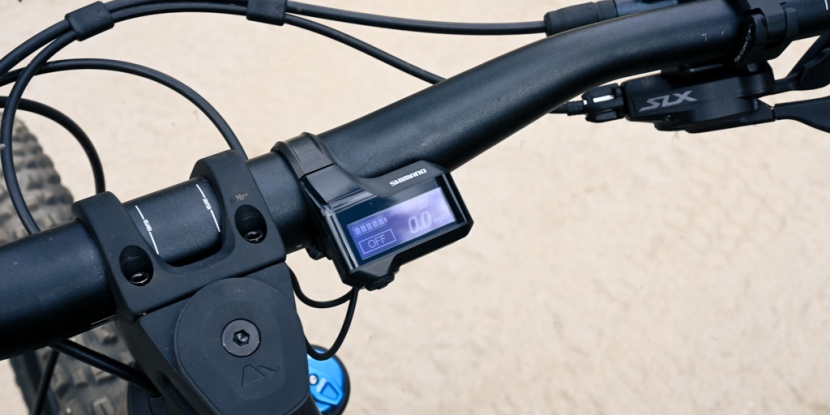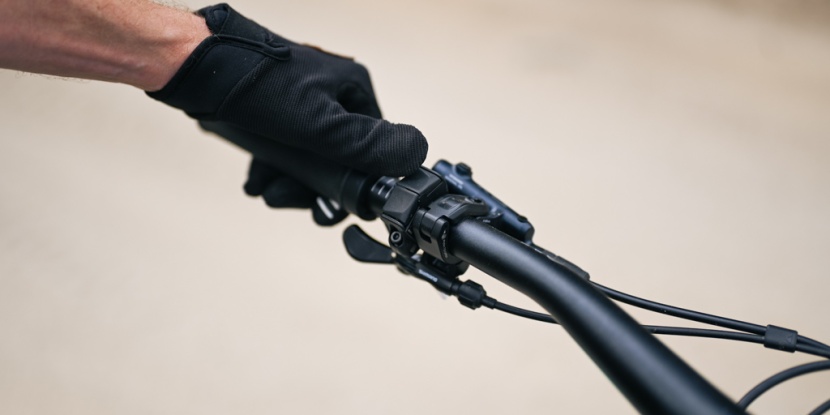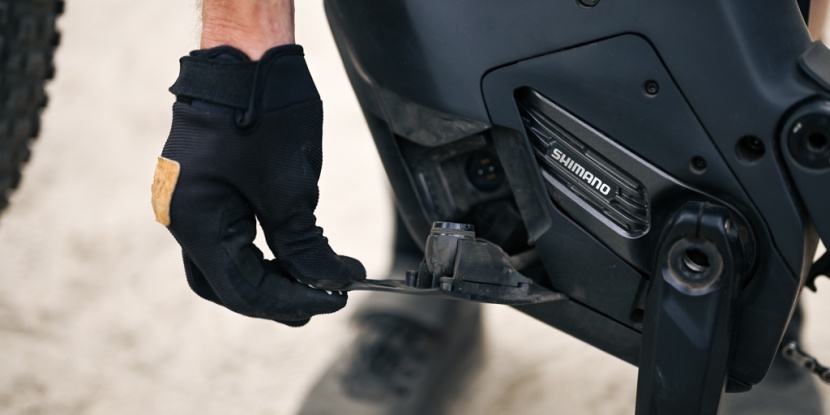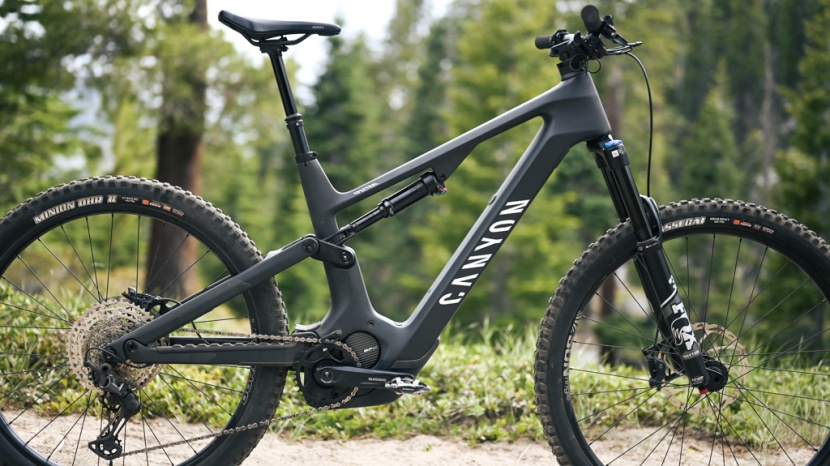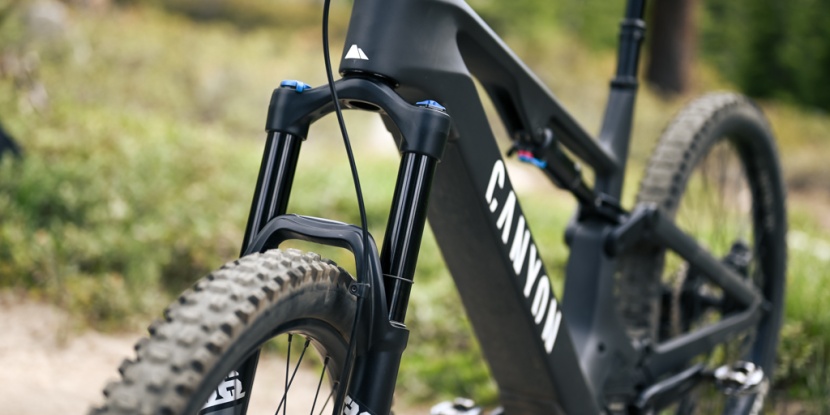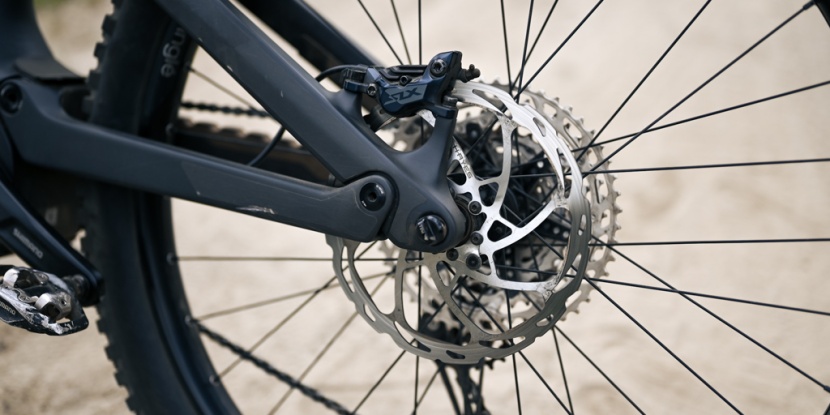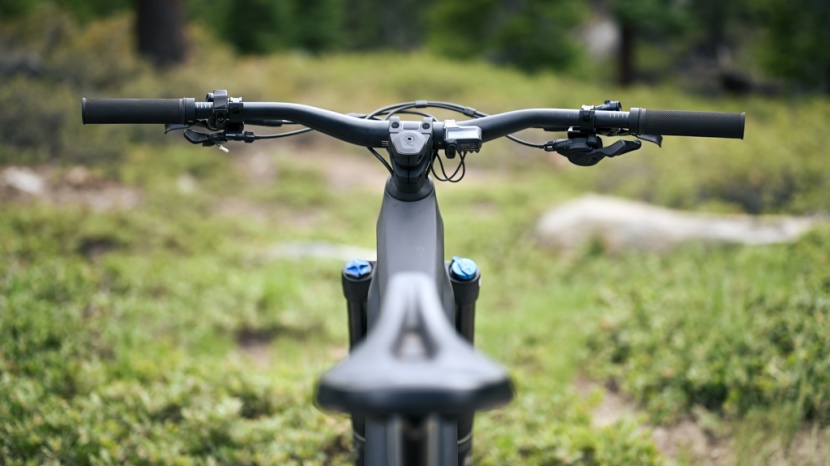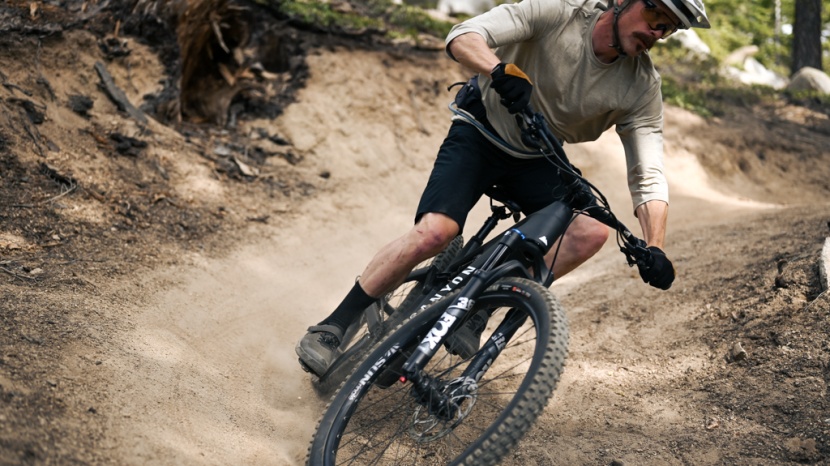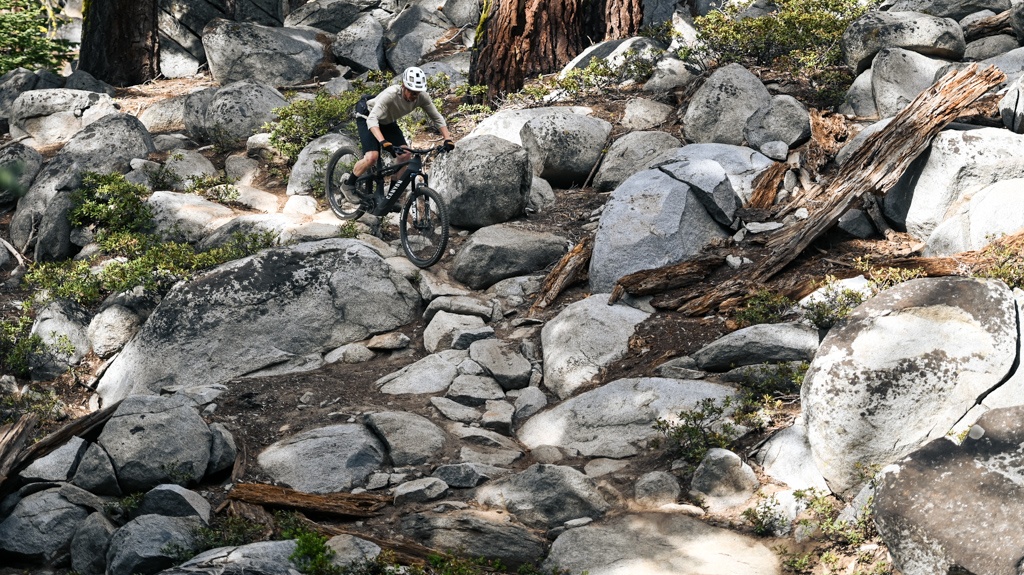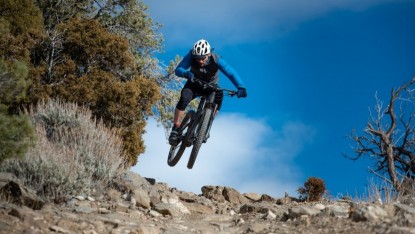Canyon has announced a stop use order for this bike and asks consumers to inspect their batteries for damage. For more info, check out the Canyon website.
Our Verdict
Canyon has announced a stop use order for this bike and asks consumers to inspect their batteries for damage. For more info, check out the Canyon website.
Compare to Similar Products
 This Product
Canyon Spectral:ON CF 8 | |||||
|---|---|---|---|---|---|
| Awards | Best for Range | Best Overall E-MTB | Best Bang for the Buck | Best Lightweight e-mountain bike | |
| Price | $6,999 List | $7,000 List | $2,899 List $2,599 at Aventon Bikes | $8,000 List | $3,899 List |
Overall Score  |
|||||
| Star Rating | |||||
| Bottom Line | A well-rounded trail riding e-MTB with a huge battery, nice build, and reasonable price | Continued refinement keeps this well-rounded model at the top, and the highly adjustable geometry makes it more versatile than ever | Any assessment of this bike has to follow the price tag; many people don't need or want a 5-figure e-bike, and Aventon delivers a banger | More than splitting the difference between a trail bike and a full-power e-bike, this could be the ultimate trail bike | A solid value with just a few compromises: an excellent first e-bike for the trail rider |
| Rating Categories | Canyon Spectral:ON... | Specialized Turbo L... | Aventon Ramblas | Specialized Turbo L... | Ari Wire Peak 2.0 Comp |
| Downhill Performance (30%) | |||||
| Climbing Performance (25%) | |||||
| Measured Effective Range (25%) | |||||
| Power Output (15%) | |||||
| E-Bike Controls (5%) | |||||
| Specifications | Canyon Spectral:ON... | Specialized Turbo L... | Aventon Ramblas | Specialized Turbo L... | Ari Wire Peak 2.0 Comp |
| Battery Size (Wh) | 900Wh | 700Wh | 708Wh | 320Wh (+160Wh Range Extender) | 635Wh |
| Wheel size (inches) | MX (29" front, 27.5" rear) | MX (29" front, 27.5" rear) | 29 | MX (29" front, 27.5" rear) | 29 |
| Motor System | Shimano EP8 | Specialized Turbo Full Power 2.2 | Aventon A100 | Specialized SL 1.2 (320W) | Shimano E7000 |
| Motor Power (torque) | 85Nm | 90Nm | 100Nm | 50Nm | 60Nm |
| Measured Weight (w/o pedals) | 51 lbs 15 oz (Large) | 51 lbs 3 oz (S4) | 54 lbs (Large) | 40 lbs 1 oz (S4)(2lbs 6 oz - range extender battery) | 55 lbs (Large) |
| Measured Effective Range | 38.5 miles | 33.1 miles | 30.1 miles | 21.1 miles | 20.5 miles |
| Fork | Fox 36 Rhythm Grip, 150mm | Fox Rhythm 36, 160mm | Rock Shox 35 | Fox 36 Rhythm 160mm | RockShox Recon SIlver RL 150mm |
| Suspension & Travel | Triple Phase155mm | Future Shock Rear (FSR) - 150mm | N/A | Future Shock Rear (FSR) - 150mm | 4- bar Linkage |
| Shock | Fox DPS Performance EVOL | Fox Float X Performance | N/A | Fox Float X Performance (FSR) 150mm | X-Fusion 02 Pro RL |
| Frame Material | Carbon Fiber | M5 Premium Aluminum | Aluminum | FACT 11M Carbon Fiber | Aluminum |
| Frame Size Tested | Large | S4 | Large | S4 | Large |
| Available Sizes | S-XL | S1-S6 | S-XL | S1-S6 | S-XL |
| Wheelset | SunRingle Duroc SD37 Comp | Specialized 29 Alloy | Double Wall Ally rims, 13g spokes, 110/148 hubs | Roval Traverse 29, 30mm internal | WTB ST i30 TCS |
| Front Tire | Maxxis Assegai EXO 29 x 2.5 | Specialized Butcher GRID TRAIL GRIPTON T9 29" x 2.6" | Maxxis Rekon 29x2.4" | Specialized Butcher GRID TRAIL GRIPTON 2.3" | Maxxis Minion DHF EXO 29 x 2.5" WT |
| Rear Tire | Maxxis Minion DHR II EXO+ 27.5 x 2.6 | Specialized Eliminator GRID TRAIL GRIPTON T7 27.5" x 2.6" | Maxxis Rekon 29x2.4" | Specialized Eliminator GRID TRAIL 2.3" | Maxxis Dissector EXO 29x2.4" |
| Shifters | Shimano SLX 12-speed | SRAM GX Eagle 12-speed | SRAM NX Eagle | SRAM GX Eagle | SRAM SX Eagle |
| Rear Derailleur | Shimano XT | SRAM GX Eagle | SRAM NX Eagle | SRAM GX Eagle | SRAM SX Eagle |
| Crankset | Shimano STEPS | Praxis M30 | Aventon | SRAM Alloy | Shimano FC-E8000 |
| Crankarm length | 165mm | 160mm | 165 | 170mm | 160mm |
| Cassette | Shimano Deore M6100 10-51T | SRAM XG1275, Eagle 10-52T | SRAM PG-1210 10-50t | SRAM XG1275 10-52T | SRAM PG-1210 11-50t |
| Chain | Shimano CN-M6100 | SRAM NX Eagle | SRAM NX Eagle | SRAM NX Eagle | SRAM SX Eagle |
| Saddle | Fizik Terra Aidon X5 | Specialized Bridge Comp | Aventon Padded | Specialized Bridge Comp | Selle Italia X3 boost 148mm |
| Seatpost | Iridium, 175mm (size Large) | X-Fusion Manic 175mm (S4/S5) | 31.6, 150mm droppers (125mm on S) | X-Fusion Manic 175mm (large) | X-Fusion Manic 175mm (Size Large) |
| Handlebar | Canyon:ON HB0057 Riser | Specialized Alloy 780mm | Alloy 760mm, 35mm, 9 deg rise | Specialized Trail 780mm | Ari Team 35 800mm 25mm rise |
| Stem | Canyon:ON ST0031 | Specialized Alloy Trail | 35mm Ø, 40mm length | Specialized Trail 50mm | Ari 35 |
| Brakes | Shimano SLX M7120 4-piston | SRAM Code R 4-piston 220mm front and 200mm rear rotor | SRAM DB8 200mm / 180mm | SRAM Code RS 4-piston | TRP Slate EVO 200mm rotors |
| Grips | Canyon Lock-On | Specialized Trail Grips | Lock-On | Specialized Trail | Lock-On |
| Measured Effective Top Tube (mm) | 637 | 630 | 642 | 631 | 613 |
| Measured Reach (mm) | 485 | 477 | 455 | 470 | 480 |
| Measured Head Tube Angle | 65.5 | Adjustable between 63.5 and 65.5-degrees in 1-degree increments | 66.5 | 64.6 | 64.5 High / 64 Low |
| Measured Seat Tube Angle (effective) | 76.5 | 76.2-degrees | 74.5 | 75.8 | 79 High/ 78.5 Short |
| Measured Bottom Bracket Height (mm) | 36-drop | 350mm | 324mm | 348mm | 345mm |
| Measured Wheelbase (mm) | 1252 | 1255 | 1230 | 1238 | 1244 |
| Measured Chain Stay Length (mm) | 440 | 442 | 465 | 432 | 434 |
Our Analysis and Test Results
Canyon has continued to update the Spectral:ON since we tested it offering up multiple build kits and either the 720Wh or 900Wh battery. The new Spectral:ON rolls on mixed wheels with 155mm of rear wheel travel paired with a 150mm fork and geometry that's modern but looks almost conservative on paper by today's standards. Using the Shimano EP8 motor system, Canyon mounts the motor lower than most other manufacturers to accommodate the massive 900Wh battery. The result is one of the top all-around electric mountain bikes we've ever tested, and thanks to Canyon's consumer direct sales model, it's a great value too.
Downhill Performance
The Spectral:ON CF 8 is a well-rounded performer on the descents with travel numbers and geometry that lean more towards the trail riding and all-'rounder side of the spectrum. With fairly modern geometry and a mullet wheel set up, the bike is lively, maneuverable, and somewhat playful, but remains stable and composed in rowdy terrain. Despite the massive 900Wh battery, Canyon did a great job keeping its weight well distributed, and this bike handles better than you'd expect for tipping the scales at just over 50 lbs.
Canyon gave the Spectral:ON CF 8 a geometry that's geared towards trail riding as opposed to pure downhill performance. That's not to say that it doesn't perform well on the descents, because it certainly does, it just doesn't really have any extreme numbers that are becoming more common these days. Canyon wanted this bike to be more of a versatile all-around trail riding machine, and they nailed it. The 65.5-degree head tube angle is the sweet spot for trail riding, where steering and handling remain responsive at a wide range of speeds and the bike still feels adequately slack when rolling into steeper, more aggressive terrain. 485mm of reach on our size Large test bike provides a nice roomy cockpit while the 1,252mm wheelbase and 440mm chainstays promote stability at speed without detracting much from its maneuverability. Likewise, the 27.5-inch rear wheel helps to keep the rear end feeling sporty and agile. The bike can feel heavy in technical situations but its mass is mostly an asset. The weight distribution in the downtime keeps the bike from feeling like too much of a handful, and it contributes to outrageous traction in the corners. At the same time, it's not reluctant to move side to side and it's easy to get off the ground. In the right terrain, the bike feels energetic, fun and flickable.
Speaking generally, most modern bikes having slightly more travel up front, but that's not the case with the Spectral:ON CF 8. This bike has 155mm of rear wheel travel that's paired with a 150mm travel fork. Five millimeters is a marginal difference but a curious choice on Canyon's behalf. We found the amount of travel well suited for trail riding and even the more aggressive descents we tackled during testing. The rear suspension feels supple with good mid-stroke support, but we found the end of the travel more than a few times running 30% sag. After bumping up the air pressure to give us 25% sag, we had fewer bottom outs but we'll likely experiment with a larger volume spacer to add a little more progression at the end of the stroke. The Fox 36 Rhythm fork works well enough, but we found it to feel a bit flexy under heavy braking and rough section at higher speeds. Overall, the suspension components are adequate and get the job done, although they don't offer much adjustability and a beefier fork would certainly be an asset to this bike. Those looking for a little more front-end travel could consider putting a 160mm travel fork on the front. In addition to 10mm more travel, this would slacken the head tube angle by about 0.5-degrees and raise the bottom bracket slightly.
It's worth noting that the large bulge forward of the bottom bracket created by the motor and battery does reduce your clearance in that area. When combined with the relatively low bottom bracket height at sag, and even lower during compression, the likelihood of smashing the skid plate into obstacles on the trail is higher than with most other bikes. We experienced this a few times on the first couple of test rides before adapting and compensating for it. It takes a little getting used to but we could certainly see it leading to some harsh bottom outs and broken skid plates.
Climbing Performance
Climbing aboard the Spectral:ON CF 8 is a pleasant experience with loads of power on tap. The geometry is comfortable for the rider and lends itself to responsive handling and agility despite the mass and overall length. Whether blasting up fire roads or negotiating winding singletrack climbs, the Spectral:ON feels right at home. Clearance is a bit of an issue in super technical terrain with the larger motor/battery bulge and low bottom bracket height, but that's really our only gripe.
The geometry of the Spectral:ON CF 8 lends itself to a comfortable climbing position. A 76.5-degree seat tube angle is adequately steep, lining the rider up above the bb and keeping the rider fore of the rear axle. Combined with the generous, but not too roomy, reach of 485mm on the size large (reach increases in 25mm increments between sizes), we found ourselves in a balanced climbing position that avoids feeling too stretched out. The 65.5-degree head tube angle helps to keep the steering feeling relatively sharp, not prone to wandering the way some slacker bikes can, while the moderate length chainstays and smaller rear wheel keep the rear end easily maneuverable. With a 1,252mm wheelbase, the bike can feel long in tight technical terrain and sharp switchbacks but generally speaking, it handles most climbing situations quite well. And when in doubt, there's always the power on tap to blast up and over most things you encounter.
The rear suspension on the Spectral:ON CF 8 is fairly active when climbing, and it does a fine job of soaking up trail chatter and vibration. The rear shock does have a compression damping/climbing switch, but other than some steep paved road grinds, our testers chose to leave it open to enjoy the exceptional traction available. The bike's weight also comes into play here, helping to keep the rear wheel grounded and the tread knobs digging deep into the trail surface. The overall weight of the bike is a bit more noticeable on the uphills, particularly when muscling the bike through tricky moves and up steep ledges, but again, Canyon did a good job keeping the weight low and feeling well balanced.
Distance Range
With a whopping 900Wh battery, it stands to reason that the Spectral:ON CF 8 should have an outstanding range and potentially help get rid of range anxiety altogether. For comparison, the Canyon has a full 200Wh more than the Specialized Turbo Levo Comp Alloy with its 700Wh battery. That's 28% more! To see how it performs, we did a range test on our standardized test for comparison, and we took it for many long trail rides to see how that translates to real-world riding.
In the Boost setting, our range test rider rode the Spectral:ON CF 8 for 38.5 miles with 5,292 vertical feet of elevation gain. That's a pretty impressive distance to travel, particularly when using the highest output setting the whole time. In fact, it's a little over 5 miles farther than we rode the Specialized Turbo Levoon the same course. This test is great for comparative purposes, but since most of us don't do laps on e-MTBs on pavement, we took it for some battery-draining rides as well. One particular ride involved 33.8 trail miles with 6,246 vertical feet of climbing while using the power gratuitously in boost and trail modes, and our tester finished with a full bar of battery to spare. We think it's safe to assume the battery had roughly another 5 miles and 1,000 vertical left, and that we could've stayed out even longer with more conservative pedal assist usage. That ride would've killed the batteries of pretty much any other bike we've ever tested, and we would have spent the last few miles worrying about the battery dying. Not the case with the Spectral:ON.
Power Output
Shimano's EP8 motor is quite common in the world of electric mountain bikes, and after testing it on several different models, we think it works great. While it may not have the highest torque on the market, it is fairly compact, reasonably lightweight, relatively quiet, and plenty powerful, in addition to providing three customizable levels of pedal assist support with smooth power delivery. Our biggest gripe continues to be the minor rattling noise that comes from the gears within the motor when coasting, but that is typical of all EP8 motors.
The EP8 motor puts out 250W of nominal power and up to 500W at peak power, along with 85Nm of torque. This is just a bit shy of Specialized's Turbo Full Power 2.2 motor that boasts 90Nm of torque and 565W of peak power, but honestly, that difference is minimal, and we never found the Spectral:ON CF 8 to feel underpowered. The three levels of assist, Eco, Trail, and Boost, provide a nice spread of support to suit varying needs, terrain, and preferences, and of course, those levels are customizable through the Shimano E-Tube app, so you can set them just the way you want. When riding in the flats, it's easy to get it going up to its top assisted speed of 20 mph when riding in Boost mode, and there's plenty of power on tap to grind your way up impossible climbs. We found the power to come on smoothly when the cranks start turning and to shut off almost instantly when they stop. Shifting between support levels also felt nice and smooth, with no jerkiness but a noticeable increase/decrease in support. Of course, when you reach 20 mph and the motor cuts out, it is quite obvious, not super abrupt, but definitely noticeable if you try to accelerate on a 50+ lb bike.
The Shimano E-Tube app allows you to make changes to the pedal assist support settings. The default settings are actually quite good, but those who like to tinker will be happy to know they can dial them in exactly to their preferences. In addition to setting up two separate profiles, you can alter the support levels in three ways. Assist character is the overall level of rider support; it can be changed from Eco to Powerful in ten increments. Maximum Torque is simply that, and it can also be adjusted in ten Nm increments from 25Nm to 85Nm. Assist Start changes the sensitivity of the motor at the initial part of the pedal stroke with 5 settings from mild to quick. It's easy enough to just ride the Spectral:ON CF 8 in its default setting, but it also isn't that hard to optimize the pedal assistance for your riding style, terrain, and preferences.
E-Bike Controls
Seeing that the Spectral:ON CF 8 comes equipped with the Shimano EP8 motor, it comes as no surprise that it is also equipped with relatively standard Shimano controls and the E7000 display. We've grown accustomed to this system, and find it to be one of the best around. The controls are low-profile and have good ergonomics, the display shows you pertinent info at a glance, it can also be synced with the Shimano E-tube app to customize your settings. The battery is housed in the downtube of the frame, and it can also be removed by sliding it out from the bottom.
The main power button is located on the top of the downtube and it is used to turn the bike's power on and off. The charging port cover also needs to be properly closed for the bike to turn on, as it serves as the connection between the battery and the motor. The small control unit is located on the handlebar next to the left grip, and this low-profile unit has two buttons to shift up and down through the pedal assist levels. We've used these controls many times before, and they have good ergonomics and allow for plenty of clearance for typical 1x style dropper post levers. The bottom button also engages the bike's walk assist which pushes the bike forward at a walking pace when you press and hold it.
At this point, we're quite familiar with Shimano's E7000 display. This little monochrome unit mounts to the handlebar next to the stem in a relatively easy-to-see location, and it shows your remaining battery charge, pedal assist setting, and current speed. Remaining battery life is displayed as a small battery graphic with 5 bars, each of which represents approximately 20% of the battery charge. While this works fine, we think it would be really nice to also have that information shown as a more accurate numerical percentage. Pressing the small button on the bottom of the display brings you to additional data pages, but we found the default page to be the most useful while riding. Realistically, once you get used to riding an electric mountain bike, you don't really need to look at the display much anyway. You can also sync to the bike through Shimano's E-Tube app where you can customize the pedal assist settings or set up two distinct profiles. Adjustments can be made to assist character, maximum torque, and assist start (how quickly the power ramps up) to all three support levels, Eco, Trail, and Boost, so you can make the pedal assist feel exactly how you want it to. Firmware updates and troubleshooting error codes can also be done through the app.
A 900Wh battery is quite large, and to fit it within the frame of the Spectral:ON CF 8, Canyon designed their own battery packs andshifted the EP8 motor's orientation slightly. This allows them to position the thin but wide battery as low as possible in the frame to keep the center of gravity low to have as little effect as possible on the bike's handling. In fact, the bottom portion of the battery sits in front of the motor. The charging port cover in on the non-drive side of the frame near the bottom of the downtube, and it serves not only as the cover but also as the electrical connection between the battery and motor. We found it quite easy to line up the magnetic Rosenberger-style plug for charging. We have heard complaints from other users that the charging cover can easily be dislodged by your foot while riding, but we didn't experience that while testing. Should that happen, however, it would shut down power to the motor. Removing the battery from the frame is possible, but you'll need access to the bottom of the bike to flip open the large plastic skid plate that protects the battery and motor. Once this plate is open, the battery can be pulled out from the bottom to be swapped out or for charging off the bike.
Build
The “CF” in Spectral:ON CF 8 stands for carbon fiber, and not surprisingly, this bike features a full carbon frame. Given the ever-increasing prices in the mountain bike industry over the past few years, the fact that the Spectral:ON comes with a carbon frame and is still reasonably priced (relatively speaking) is very impressive. A Horst Link or 4-bar suspension system controls the 155mm of rear wheel travel, and that is paired with a 150mm fork. The Shimano EP8 motor has been angled slightly to make room for the huge 900Wh battery and to position the weight as low as possible in the frame. This results in a larger than usual bulge at the bottom of the downtube/in front of the bottom bracket. Otherwise, the frame has clean lines, internal cable routing, and chainstay and motor/battery bulge protection. The frame can accept a bottle cage, but you'll need to get a proprietary one directly from Canyon. It comes in 4 sizes, S-XL, with 900Wh batteries coming standard on all sizes except for small which comes with a 720Wh battery and costs a few hundred dollars less.
The suspension on the Spectral:ON CF 8 is adequate, but it's one place we found fault with the build. That said, considering the price of this bike, we aren't complaining too loudly. The 150mm of front suspension is controlled by a Fox Rhythm 36 fork. In general, this fork works well enough, particularly on high speed flowy descents and larger single hits. In successive hits, high-frequency chop, and fast chunky sections of trail, we noticed a bit of flex, which we attribute mostly to the fact that this fork does not appear to be the e-bike-specific version with the beefier crown. We don't consider it a deal-breaker, but it is certainly notable and would likely be the first thing we'd upgrade. The rear shock is a Fox DPS Performance EVOL, and while not particularly flashy, it performed its duties admirably with only a handful of bottom outs on particularly flat landings. We ended up running 25% sag to get a little more support ad bottom out resistance.
The drivetrain duties are tasked to a Shimano SLX/XT combo with a 12-speed XT derailleur paired with an SLX shifter, a Deore cassette, and 165mm Shimano cranks. The shifting performance was great, and there's plenty of range for all situations. We'd normally gripe about the weight of the Deore cassette, but with all that power, we don't really think it matters all that much. Braking duties are tasked to a set of 4-piston SLX stoppers paired with 203mm Hayes rotors front and rear. These brakes work as well as their more expensive counterparts and provide ample control and stopping power for this heavyweight bike.
Canyon equipped the Spectral:ON CF 8 with a handful of house brand parts in the cockpit. The short, stout stem clamps onto a modern width Canyon riser bar and has a very clean and aggressive look. Cables are routed through the headset, and while this certainly provides a clean setup, we could see it presenting issues when it comes time to do some maintenance. We also don't love the proprietary stem spacers but have to admit that the whole setup looks great. At the back of the bike, the 175mm Iridium seatpost (drop length varies by frame size) works well to get the saddle low for descents and didn't cause us any problems, and we found the Fizik Terra Aidon X5 saddle to be plenty comfortable.
The Spectral:ON CF 8 uses a mixed-wheel setup. This consists of a set of tubeless-ready SunRingle Duroc Comp SD37 wheels with a 27.5-inch in the rear and 29-inch up front. The rims have a 32mm inner width that works well with modern tire sizes, and we found them to be surprisingly resilient during testing. A beefy 2.5-inch wide Maxxis Assegai EXO provides outstanding cornering and braking traction at the front of the bike while a 2.6-inch Maxxis Minion DHR II EXO+ is the perfect pairing as a rear tire. While we love the performance of this tire setup, we feel the casings chosen are a little under-gunned for the weight and hard-charging capabilities of this bike. Fortunately, tires are an inexpensive upgrade.
Should I Buy the Canyon Spectral:ON CF 8?
Anyone seeking a well-rounded electric mountain bike for trail riding or those looking to put in serious miles should definitely consider the Spectral:ON CF8. With 155/150mm of travel, a balanced trail riding geometry, and a great build for the price, this bike can handle virtually anything that comes down the trail with confidence and composure. The massive 900Wh battery basically does away with range anxiety, making this a great choice for those who want to go on big adventure rides or bang out as many laps as possible without fear of killing the battery. It's also very competitively priced, with a carbon frame and solid spec that goes for less than alloy models with less impressive builds. We think you'd be hard-pressed to find a better e-MTB at this price.
What Other Electric Mountain Bikes Should I Consider?
With a killer all-around performance, an amazing range, and a competitive price, the value proposition of the Spectral:ON CF 8 is really hard to beat, but there are other great options. The Specialized Turbo Levo Comp Alloy is another great bike with the powerful Turbo Full Power 2.2 motor, a sizeable 700Wh battery, and 150/160mm of travel. It costs a bit more with an alloy frame and a similar but slightly less impressive build, but it performs just as well on the trail and has a highly adjustable geometry that we feel makes it a bit more versatile overall. If you're on a tighter budget, the Aventon Ramblas will set you back quite a bit less. While its build is a bit more budget-oriented, its abundant power and 708Wh battery give it an impressive range.


